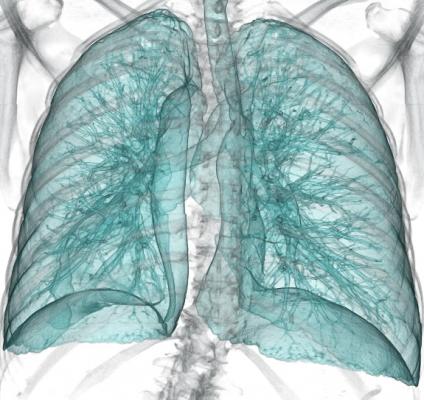
Image courtesy of Toshiba
February 11, 2015 — The American Society for Radiation Oncology (ASTRO) commends the February 5, 2015, decision by the Centers for Medicare and Medicaid Services (CMS) to provide coverage for annual lung cancer screening via low-dose CT screening for those at highest-risk for lung cancer.
The final Decision Memo for Screening for Lung Cancer with Low Dose Computed Tomography (LDCT) details that there is sufficient evidence to warrant annual lung cancer screening for patients most at-risk for developing lung cancer. The memo outlines the patient criteria for eligibility as follows: aged 55 to 77; showing no signs or symptoms of lung disease; a smoking history of at least 30 pack-years (one pack-year = smoking one pack per day for one year; one pack = 20 cigarettes) and a current smoker or someone who has quit smoking within the last 15 years.
ASTRO Chair Bruce G. Haffty, M.D., FASTRO remarks that, “This year in the United States, it is estimated that nearly 230,000 men and women will be diagnosed with lung cancer, and that there will be more than 160,000 deaths from lung cancer, more deaths than from breast, colon and prostate cancers combined. This highly effective, annual screening is a critical and powerful tool that will enable us to diagnose patients earlier when treatments are most effective, and it will fortify our efforts to battle this destructive disease.”
In addition to detailing the patient health status for annual screening, the final decision also enumerates specific facility criteria and requirements, and care steps prior to and following screening. Two valuable care steps include 1) a shared-decision making/smoking cessation counseling session between the physician and patient prior to the first screening and 2) access to smoking cessation sessions available to current smokers – vital services that encourage current smokers to stop smoking, which directly impacts their treatment outcome. Distinct screening guidelines are also provided: administer CT dose index volume of 3 mGy or less for standard-sized patients (approximately 155 lbs.) with appropriate reductions for smaller patients and increases for larger patients; utilize a standardized lung nodule identification, classification and reporting system and collection and submission of patient data to a CMS-approved registry for each LDCT screening test.
CMS’s decision follows the United States Preventive Task Force’s (USPSTF’s) December 2013 recommendation that LDCT is a Grade B screening, and which reviewed the results of four randomized clinical trials, including the National Cancer Institute’s National Lung Screening Trial, which included more than 50,000 asymptomatic adults aged 55 to 75 who had at least a 30 pack-year history and found a 16 percent reduction in lung cancer mortality for those who received annual screening and thus, earlier treatment.
For more information: www.astro.org


 February 09, 2026
February 09, 2026 









